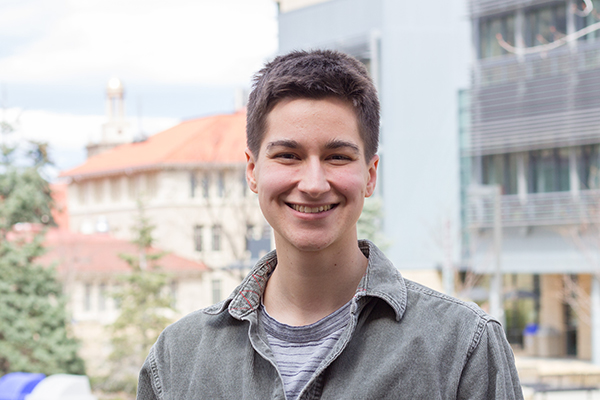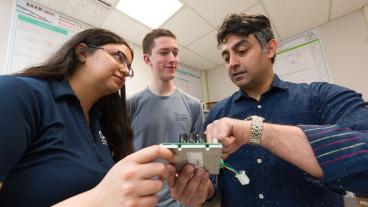A Colorado School of Mines PhD candidate in geochemistry is headed to France later this year after receiving a Fulbright grant to analyze European river waters, compare them to North American samples and improve methods for detecting the presence of engineered nanoparticles.
 Logan Rand will spend nine months conducting research at the Institut de Physique du Globe de Paris with Professor Marc Benedetti. Benedetti has previously collaborated with Rand’s advisor, Chemistry Professor James Ranville, and has sent some of his students to conduct research at Mines.
Logan Rand will spend nine months conducting research at the Institut de Physique du Globe de Paris with Professor Marc Benedetti. Benedetti has previously collaborated with Rand’s advisor, Chemistry Professor James Ranville, and has sent some of his students to conduct research at Mines.
Rand’s research revolves around single-particle inductively coupled plasma-mass spectrometry or spICPMS, a relatively new technique for detecting engineered nanoparticles that has been developed in Ranville’s lab over the past decade. Nanoparticles are between 1 nanometer (a billionth of a meter) and 100 nanometers in size. Synthetic nanoparticles are used in industrial processes and many personal care products, such as sunscreen.
While spICPMS has worked well in controlled laboratory environments, “the challenge we’re looking at is improving our capability of detecting an engineered nanoparticle in natural systems,” Rand said. “When it enters the water system, can we detect it, and can we distinguish it from the natural background of mineral nanoparticles?”
For example, over Labor Day weekend in 2016, Rand took water samples from Clear Creek in Golden, Colo., in an attempt to measure the titanium released from the sunscreen worn by tubers and other people enjoying the water. “We’re still working on the analysis of that study,” Rand said. “It’s a tricky problem because there’s a lot of background of titanium—it’s a signal-to-noise problem. How much titanium would need to be input for us to be able to detect it above the naturally occurring level?”
Engineered nanoparticles are a concern not just because of any inherent toxic properties, but because they can persist longer than naturally occurring chemicals, further building up toxicity. “A lot of them don’t go away after water treatment,” Rand said. “Sometimes it’s not bad, and they degrade naturally on their own, but we really should be able to measure them and track their fate and transport.”
During his time in France, Rand will focus on trying to solve that background issue—“establish a baseline, what is normal for different water systems, so we can detect the anthropogenic input.” Rand will bring samples of river water from the U.S. and also compare variations in the spICPMS technique between the countries. “It’s not going to be a small undertaking,” Rand said.
The Fulbright award will also put other skills to use for Rand. “I took French classes from high school to half of college and studies in Martinique,” he said. “I never thought French would turn out to be so useful.” While he’s not fluent, he can communicate well in French and performed well in the language test that is part of the Fulbright application process.
“Fulbright really looks for students who can serve as ambassadors. It’s not just about pushing research, but also about improving relations between countries,” Rand said. “They want students who want to be culturally involved and are committed to interacting with people abroad.”
Contact:
Mark Ramirez, Managing Editor, Communications and Marketing | 303-273-3088 | ramirez@mines.edu
Ashley Spurgeon, Assistant Editor, Mines Magazine | 303-273-3959 | aspurgeon@mines.edu



